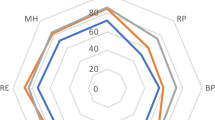Abstract
We hypothesized that poor quality of life may lead to the development of post-operative hyperglycemia, as it is more likely to be associated with stress-induced impairment of glucose control. A correlation between the components of quality of life, and blood glucose changes after Coronary Artery Bypass Surgery (CABG) was examined. In a cross-sectional study, 268 consecutive patients undergoing CABG at Tehran Heart Center were recruited. Postoperative blood glucose were measured every 2 to 4 h for 24 h following surgery. Quality of life was assessed using the SF-36 questionnaire, and the physical and mental component summary scores were used to analyze data. An adverse relationship was found between mental summary score and the mean of plasma glucose concentrations during 24 h after surgery (β = −0.152, SE = 0.076, P = 0.046). No significant association was found between physical summary score and mean of plasma glucose concentration during this time. Postoperative blood glucose changes may be independently associated with patients’ mental status preoperative, as reflected by mental component of quality of life.
Similar content being viewed by others
References
Tapp RJ, Dunstan DW, Phillips P, Tonkin A, Zimmet PZ, Shaw JE. Aus Diab Study Group. Association between impaired glucose metabolism and quality of life: results from the Australian diabetes obesity and lifestyle study. Diabetes Res Clin Pract. 2006;74:154–61.
Redekop WK, Koopmanschap MA, Stolk RP, Rutten GE, Wolffenbuttel BH, Niessen LW. Health-related quality of life and treatment satisfaction in Dutch patients with type 2 diabetes. Diabetes Care. 2002;25:458–63.
Lloyd A, Sawyer W, Hopkinson P. Impact of long-term complications on quality of life in patients with type 2 diabetes not using insulin. Value Health. 2001;4:392–400.
Gandhi GY, Nuttall GA, Abel MD, Mullany CJ, Schaff HV, Williams BA, et al. Intraoperative hyperglycemia and perioperative outcomes in cardiac surgery patients. Mayo Clin Proc. 2005;80:862–6.
Gandhi GY, Nuttall GA, Abel MD, Mullany CJ, Schaff HV, O’Brien PC, et al. Intensive intraoperative insulin therapy versus conventional glucose management during cardiac surgery, A randomized trial. Ann Intern Med. 2007;146:233–43.
van den Berghe G, Wouters P, Weekers F, et al. Intensive insulin therapy in critically ill patients. N Engl J Med. 2001;345:1359–67.
Ingels C, Debaveye Y, Milants I, Buelens E, Peeraer A, Devriendt Y, et al. Strict blood glucose control with insulin during intensive care after cardiac surgery: impact on 4-years survival, dependency on medical care, and quality-of-life. Eur Heart J. 2006;27:2716–24.
Furnary AP, Gao G, Grunkemeier GL, Wu Y, Zerr KJ, Bookin SO, et al. Continuous insulin infusion reduces mortality in patients with diabetes undergoing coronary artery bypass grafting. J Thorac Cardiovasc Surg. 2003;125:1007–21.
Ascione R, Rogers CA, Rajakaruna C, Angelini GD. Inadequate blood glucose control is associated with in-hospital mortality and morbidity in diabetic and nondiabetic patients undergoing cardiac surgery. Circulation. 2008;118:113–23.
Definition and Diagnosis of Diabetes Mellitus and Intermediate Hyperglycemia. World Health Organization. 2006. www.who.int/diabetes/publications/Definition and diagnosis of diabetes_new.pdf. Accessed 2012-05-08.
Najafi M, Sheikhvatan M, Montazeri A, Sheikhfathollahi M. Reliability of World Health Organization’s Quality of Life-BREF versus Short Form 36 Health Survey questionnaires for assessment of quality of life in patients with coronary artery disease. J Cardiovasc Med. 2009;10:316–21.
Ware Jr JE, Kosinski M, Bayliss MS, McHorney CA, Rogers WH, Raczek A. Comparison of methods for the scoring and statistical analysis of SF36 health profile and summary measures. Med Care. 1995;33:264–79.
D’Arrigo T. Stress and Diabetes. Diabetes Forecast. 2000;53:56–60.
Seematter G, Guenat E, Schneiter P, Cayeux C, Jéquier E, Tappy L. Effects of mental stress on insulin-mediated glucose metabolism and energy expenditure in lean and obese women. Am J Physiol Endocrinol Metab. 2000;279:799–805.
Faulenbach M, Uthoff H, Schwegler K, Spinas GA, Schmid C, Wiesli P. Effect of psychological stress on glucose control in patients with Type 2 diabetes. Diabet Med. 2012;29:128–31.
Wiesli P, Schmid C, Kerwer O, Nigg-Koch C, Klaghofer R, Seifert B, et al. Acute psychological stress affects glucose concentrations in patients with type 1 diabetes following food intake but not in the fasting state. Diabetes Care. 2005;28:1910–5.
Moan A, Høieggen A, Nordby G, Os I, Eide I, Kjeldsen SE. Mental stress increases glucose uptake during hyperinsulinemia: associations with sympathetic and cardiovascular responsiveness. Metabolism. 1995;44:1303–7.
Hanson CL, Henggeler SW, Burghen GA. Model of associations between psychosocial variables and health-outcome measures of adolescents with IDDM. Diabetes Care. 1987;10:752–8.
Lloyd CE, Wing RR, Orchard TJ, Becker DJ. Psychosocial correlates of glycemic control: the Pittsburgh Epidemiology of Diabetes Complications (EDC) Study. Diabetes Res Clin Pract. 1993;21:187–95.
Acknowledgement
This research project was supported by Tehran University of Medical Sciences. We wish to thank all researchers who took part in this study for their kind assistance in filling questionnaire.
Author information
Authors and Affiliations
Corresponding author
Rights and permissions
About this article
Cite this article
Najafi, M., Sheikhvatan, M. & Montazeri, A. Blood glucose concentrations after cardiac surgery: the impact of preoperative quality of life. Int J Diabetes Dev Ctries 32, 93–97 (2012). https://doi.org/10.1007/s13410-012-0075-1
Received:
Accepted:
Published:
Issue Date:
DOI: https://doi.org/10.1007/s13410-012-0075-1




